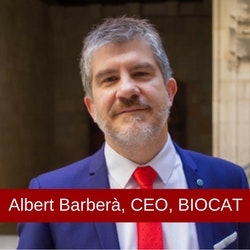Welcome to Barcelona – one of the most vibrant life sciences hub in Europe


Guest article by BIOCAT, the Bioregion of Catalonia
After the great success of previous editions (2010 and 2013), the Bioregion of Catalonia is again hosting BIO-Europe Spring® 2017 (March 20–22), in the framework of a strong and dynamic life sciences ecosystem.
“Hosting BIO-Europe Spring again is an outstanding opportunity to bring together the international community and offer new partnering opportunities to the most relevant agents,” said Albert Barberà, CEO of Biocat, the organization that coordinates and promotes the health and life sciences sector in Catalonia.
In fact, according to the FDI European Cities and Regions of the Future 2016/2017 report (FDI Intelligence division of the Financial Times), Catalonia will be Southern Europe’s most attractive region for foreign investment. Furthermore, Barcelona is in the lead to be among the top 10 European cities of the future.
“Catalonia has more pharmaceutical companies per capita than any country in Europe, except Belgium,” Barberà explained. “The Spanish pharmaceutical industry is mainly concentrated in Catalonia, where 40% of the sector’s laboratories are located, and it is also home to the world’s top biopharmaceutical companies.”
In addition, Spain’s Catalonia region is also ranked fourth among European countries in terms of biotechnology and second in the European Research Area in grants per million inhabitants.
Over the past two years, the number of medium-sized companies has doubled and accounts for 22% of all companies, which is a sign of progressive consolidation in the sector. Furthermore, the 58% of the companies are trading their products in international markets.
Catalonia has drawn the attention of international investors due to its great potential of research. In fact, the BioRegion attracted more than EUR 151 million in investment between 2013 and 2016. The Catalan biotech company Oryzon Genomics signed the largest deal ever reached by a Spanish biotechnology firm, selling the rights to exploit its experimental drug for cancer treatment licensed to Roche in 2014 in an operation valued at USD 500 million.
Another success story was carried out by Minoryx Therapeutics in 2015, a company doing research into rare neurodegenerative diseases that closed a EUR 19.4-million round to fund clinical validation of MIN-102.
to fund clinical validation of MIN-102.
Furthermore, a Catalan investment manager, Ysios Capital, led in 2015 the most important round ever seen in a Spanish biotechnology company, involving Sanifit, which obtained EUR 36.6 million to fund development of a drug to treat cardiovascular disease linked to calcification in kidney dialysis patients.
The Catalan research model, based on autonomous centers, results-based contracts, independent assessment of national and international experts and a firm commitment to attracting talent (through ICREA programs), has been proven among the top bodies in the world: CRG (ranked ninth in the top 100 biomedical centers in the world), ICIQ (ranked first world institution in chemistry) and ICFO (ranked first world institution in physics).
Another breakthrough was the Barcelona Center of Science and Technology (BIST) creation in 2015, which brings together six large Catalan research centers aiming to create the conditions necessary to promote top-notch research and boost the international visibility of member centers: a joint total of 1,700 researchers generated around 1,000 scientific publications per year in journals like Nature and Science.
In academia, Catalonia has one university among the 49 top universities in the world in scientific production (UB), three universities among the top 200 in the world (UB, UAB, UPF) and two of the ten best business schools in Europe (IESE, Esade).
Recently in 2016, an historic milestone was announced: La Caixa Foundation (one of the top financial holdings in Spain) will rank as the third on biomedical investment worldwide, tripling its funding from EUR 30 million to EUR 90 million in three years (2017–2019).
Barcelona attracts nearly 40% of foreign annual investments in Spain and is home to more than 3,400 international companies, most of them related to innovation and high-end technology services, the perfect environment for partnering and new business opportunities in pharma and biotech arenas.
“We must grow and be prepared to face the complexities of the biotech and pharma industry sector. One of the main challenges in the BioRegion of Catalonia is the access to venture capital: acquiring new financing pathways to develop the proof of concept as well as attracting more international private funds. That’s one of the main reasons we are enthusiastic hosting BIO-Europe Spring once again in Barcelona,” said Barberà.
Discover partnering opportunities at BIO-Europe Spring, the premier springtime partnering conference bringing together a “whoʼs who” from biotech, pharma and finance in Europe's most innovative biopharma clusters.
![]()